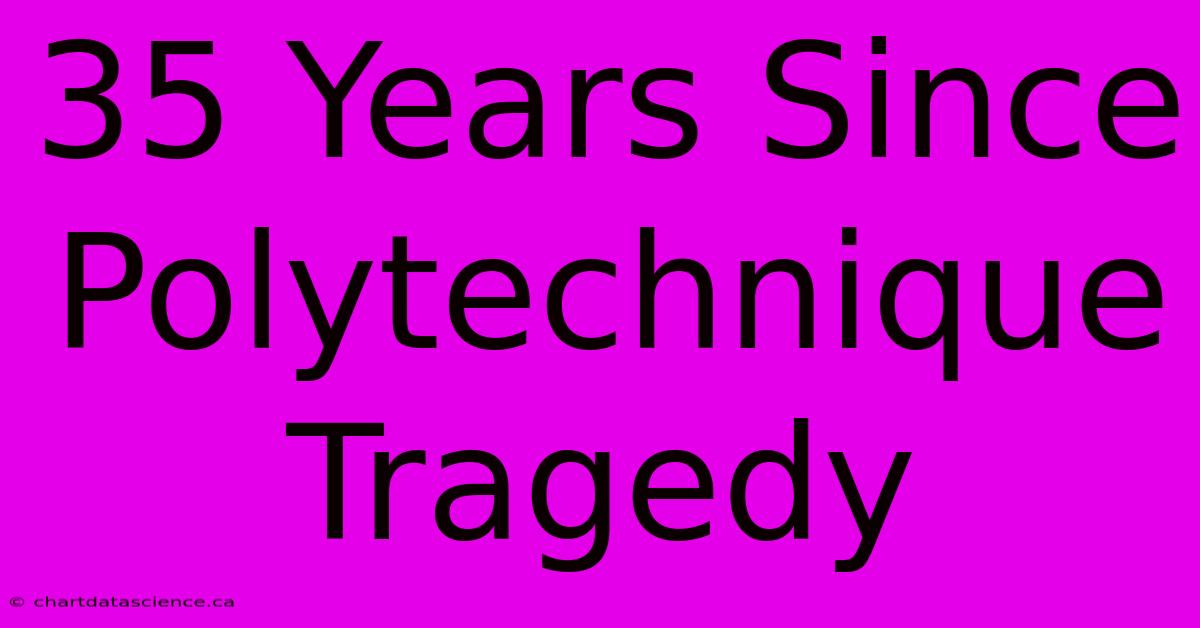35 Years Since Polytechnique Tragedy

Discover more detailed and exciting information on our website. Click the link below to start your adventure: Visit My Website. Don't miss out!
Table of Contents
35 Years Since the Polytechnique Massacre: Remembering the Victims and Fighting for Gender Equality
Thirty-five years have passed since the horrific Polytechnique Massacre, a tragedy that forever etched itself into Canadian history. On December 6, 1989, a gunman opened fire at the École Polytechnique de Montréal, claiming the lives of 14 young women and injuring 13 others. This act of violence, driven by misogyny and hatred, was a stark reminder of the pervasive issue of gender-based violence and the ongoing fight for gender equality. This anniversary is not just a time for remembrance, but a crucial moment to reflect on the progress made and the work that still needs to be done.
Remembering the Victims: A Legacy of Loss
The victims, vibrant young women pursuing careers in engineering and other fields, were cruelly robbed of their futures. Their names – Geneviève Bergeron, Hélène Colgan, Nathalie Croteau, Barbara Daigneault, Anne-Marie Edward, Maud Haviernick, Maryse Laganière, Maryse Leclair, Anne-Marie Lemay, Sonia Pelletier, Michèle Richard, Annie St-Arneault, Élaine Thibodeau, and Chantal Roy – represent not just individual lives lost, but a collective blow to the potential of women in STEM and beyond. Remembering their stories is crucial to understanding the lasting impact of this tragedy.
Their Dreams, Their Potential, Their Lives
Each woman had unique aspirations and dreams, dreams brutally cut short. Their stories, often shared by family and friends in the years since, paint a vivid picture of the lives lost and the immeasurable grief suffered. Remembering them isn't just about remembering their deaths; it's about remembering the lives they lived, the contributions they would have made, and the potential that was lost.
The Impact and Legacy of December 6th
The Polytechnique Massacre sent shockwaves across Canada and the world. It sparked widespread outrage and ignited a national conversation about gender-based violence, sexism, and the need for greater protection of women. The tragedy highlighted the systemic issues that allow such violence to occur and the urgent need to address them.
The Fight for Gender Equality Continues
In the wake of the massacre, significant strides have been made. Awareness around gender-based violence has increased dramatically, leading to more resources for survivors and improved support systems. However, the fight for true gender equality is far from over. We still see alarming rates of violence against women, persistent gender inequality in various sectors, and ongoing challenges to women's rights and safety.
The Ongoing Relevance of the Polytechnique Massacre
The events of December 6th, 1989, serve as a constant reminder of the devastating consequences of unchecked misogyny and violence. The massacre's legacy compels us to remain vigilant, to continue advocating for systemic change, and to ensure that such a tragedy never happens again. The remembrance of this day is not simply a historical exercise, but a call to action.
Moving Forward: Action and Remembrance
Thirty-five years after the Polytechnique Massacre, we must recommit to creating a safer and more equitable world for all women. This requires a multifaceted approach:
- Education and Awareness: We must continue to educate ourselves and others about gender-based violence, its causes, and its consequences. Open conversations are crucial to dismantling harmful stereotypes and promoting understanding.
- Policy and Legislation: Stronger laws and policies are essential to protect women from violence and ensure accountability for perpetrators. This includes addressing systemic inequalities that contribute to gender-based violence.
- Support for Survivors: Comprehensive support services for survivors of violence are crucial to their healing and recovery. Access to resources like counseling, legal aid, and safe housing must be readily available.
- Continued Vigilance and Advocacy: We must remain vigilant in our fight for gender equality and continue to advocate for policy changes that protect women and girls from violence and discrimination.
The Polytechnique Massacre was a horrific tragedy, but its legacy can be one of positive change. By remembering the victims, acknowledging the ongoing struggle for gender equality, and taking concrete action, we can honor their memory and work towards a future where such violence is unthinkable. The fight for a world free from gender-based violence is a collective responsibility, a fight that must continue for generations to come.

Thank you for visiting our website wich cover about 35 Years Since Polytechnique Tragedy. We hope the information provided has been useful to you. Feel free to contact us if you have any questions or need further assistance. See you next time and dont miss to bookmark.
Also read the following articles
| Article Title | Date |
|---|---|
| Vancouver Eras Tour Show Updates | Dec 07, 2024 |
| Auckland Fc Vs Wellington Phoenix What To Expect | Dec 07, 2024 |
| Eastern Conference Showdown Bucks Celtics | Dec 07, 2024 |
| Middleton Bucks Vs Celtics Game Location | Dec 07, 2024 |
| Formula 1 Stars Happy Baby News | Dec 07, 2024 |
